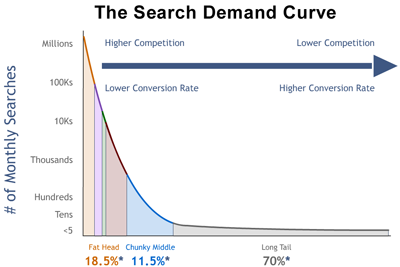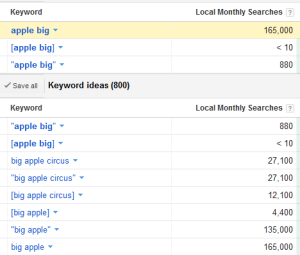11 Keyword Targeting Mistakes

I’ve been putting off an article on SEO keywords for months now. I’m a keyword research junkie, and I was afraid I’d get myself sucked into a 20 page manifesto. When it comes to SEO, figuring out which words you should use and what pages they should go on is so important and so nuanced that 20 pages wouldn’t cover everything.
Today, we’ll just focus on some of the common big mistakes the LunaMetrics team sees when it comes to keyword targeting.
1. Overemphasizing Volume
“Big numbers — YAY!”

Calm yourself, man. Volume is only part of the equation. It doesn’t matter how many people search for a word if its so competitive you’ll never get anywhere near the first search engine results page. And I’ll take a low volume key phrase that brings in people that actually convert over a keyword that brings in a large amount of worthless traffic anyday.
Never forget the long tail. The overwhelming majority of search engine traffic are those rarely searched-for long-tail key phrases, and they are more likely to convert anyways. Get that low-hanging fruit.
2. Misunderstandering Volume Estimates
But, yeah.. volume still matters. Unfortunately, a lot of people don’t know what they’re looking at here. As helpful as Google AdWords Keyword Tool is (I’m a big user myself), you can’t take the numbers at face value. Those are estimates of ad impressions, not search query volume. If you’re going to use it, make sure to look at all 3 match types and use it mostly for apples-to-apples comparisons to see which terms have more volume — be careful making organic traffic projections, and never rely solely on broad match. Also, avoid estimating organic competition solely on AdWords PPC competition, and only use Global volume if you’re targeting the entire globe.
For very important keyword research consider collecting multiple data points on search query volume. Other free tools to estimate volume include Wordtracker(limited trial), Google Trends, and Bing Webmaster Tools’ Keyword Tool.
3. Underestimating Difficulty
One of the reasons those head keywords are often the wrong choice is that ranking on the first page for them might just not be feasible. Since you might as well not exist if you’re not on the first page and click-thrus increase exponentially as you climb up the rankings, you need to pick your shots and shoot for #1.
But getting to #1 is way harder than most people realize. I’ve seen many new SEO practitioners slap half a dozen or more target keywords onto pages that barely have the ability to rank for one of the keywords. Chances are, you’re going to need to devote a single page to 1-3 semantically related keywords, and you’ll need to spend some real effort to make a compelling case that your page is the best one for searchers of said keywords to land on.
4. Targeting the Same Keyword Throughout the Site

Warning: Keyword Cannibal Lecture
So you’ve done your research, and you’ve got these sweet keywords picked out, and they have that new keyword smell and everything. “What do to with them?” you wonder. Bingo – you’ll just put those keyword into every single thing you write and you’ll be raking in traffic in no time. That’s the ticket right?
Well you’d be wrong, but not alone. First, rather than spreading your beloved keyword all over your site, you should concentrate your efforts into one page that has the page authority to rank and make it the page on the net that searchers of your keyword want to land on. Remember, in SEO , we need to pick our battles and concentrate our forces if we don’t want to get destroyed.
Secondly, this “tactic” commits the abominable SEO sin of keyword cannibalism, wherein if you do manage to rank for the keyword you’ll be competing against yourself and killing off your pages’ ability to draw new traffic for other keywords. Remember, each page is an opportunity to reel in more traffic for a different keywords.
5. Neglecting Localization in SERPs
The keyword “plumber” is searched for many times more frequently than “graphic design software”. Chances are, however, that Joe the plumber is more likely to be able to get some traffic for “plumber” than Sam the small software studio owner is for “graphic design software.” Why? Because Google is smart enough to know that when people search for plumber, they often want to find a local plumber, so Google might show Joe’s website when people in his hometown Google “plumber” in the local section of the SERPs. Given that there are a lot of local searches these days, and the ranking factors are different than standard search, it would make sense to carefully account for localization in your keyword research and targeting. Not doing so can result in missed opportunities or getting crushed by companies with a more advantageous physical address. (Trust me, I’ve learned this one the hard way.)

Tip: Switch up your location to see how localization impacts the SERPs of your keyword[/caption]
6. Failing to Look to Historical Data on Relevance/Quality
One of the best keyword research tools is right under your nose: Google Analytics. Look deep into your current organic search traffic data, and figure out why your users stick around for some keywords and bounce from others. Do keywords involving “how to” have a fraction of the conversion rate that keywords involving “price” do? I promise you there are patterns in the data of your current keywords that will help you predict which new keywords will get you good quality visits. Your web analytics is also especially useful at researching the very long tail.
7. Not Getting Assistance from Outside the SEO Dept.
It took a few years, but prudent Internet marketers realize that good SEO doesn’t exist in a vacuum. When it comes to keyword research, a solid understanding of the target audience is a going to help you target keywords that have a higher per-visit-value. Remember, you’re not targeting strings of characters — you’re trying to find the best match for user’s queries. Below are just a few examples of great places to look for assistance when doing high-level keyword research:
- PPC : Speaking of great historical data, the conversion data from any existing AdWords campaigns will be invaluable as you project the value of potential keywords.
- non-SEO marketing execs in the organization can give great insight into the target market and might be able to share previous market research. They’ll also help you utilize keywords that are consistent and perhaps synergistic with existing brand communication.
- Customer service and sales reps might have the most insight in the organization into the everyday jargon and language of the target audience.
- Competitors might be using certain words on their sites’ because they are bad at SEO or because they know something good. It could be worth a glance at their site for ideas in case the latter is the case.
- Random people who fit the target demographics might help as well. If you don’t have the budget for primary market research, your mom or uncle might help too.
8. No Strategy
Great keyword targeters utilize keyword research as one component of the larger SEO plan, which they know is itself a critical component of the larger integrated marketing communications plan. Such keyword targeters know how to use keywords to reach the audience at desired points in the conversion funnel.
Many sites inexplicably obviously target keywords on some ages of their site but fail to utilize basic keyword research for other key pages. Great keyword targeting means looking at the big picture of the entire site and to devise a plan for effective utilizing each piece of the real estate to target the right keywords.
Another myopic mistake is to simply have no long-term plan. What keywords do you want to rank #1 for over a year from now? I’ve learned the hard way the importance of thinking a few steps ahead; once you manage to hit #1 for your current keyword targets, you’ll plateau if you haven’t already been targeting new keywords.
9. Not Prioritizing
Keyword research, and SEO in general, take way too much time to not have a plan to allocate time effectively. Don’t make the mistake of not answering 2 important questions (and communicating it to the rest of the web team):
1)Which keywords deserve the most/least effort?
2)Which pages warrant the most keyword research effort based on authority and inherent ranking potential?
10. Not Doing Keyword Research Before Designing the Site Structure
Keyword research is too often an afterthought. If there are 4 lucrative competitive head keyword groups for what your eCommerce operation sells, it might make more sense to have 4 main subdirectories in your store than 20. If the lucrative long-tail keyphrases all involve a common word, it might make sense to include that word in the URL structure.
I can tell you from plenty of experience that SEO is waaay easier when the architecture compliments rather than inhibits keyword optimization. In addition, keyword research can be a useful market research tool: keyword research literally tells you how many people are interested in certain things. Yet many (dare I say most) organizations still fail to design a more consumer-oriented site by utilizing keyword research in their market research in the initial phases of site design.
11. Forgetting about that ROI
Staying ROI focused is important for keyword targeting just like everything else. If there’s a magic pill for keyword targeting, it would simply be: maximize ROI for every keyword targeted.
ROI for a keyword = Value of ranking high/cost of ranking high
The Value of Keyword = per visit value x search volume, where per visit value = value of a brand impression + (conversion rate x conversion value)
The cost of a keyword is the keyword difficulty, or the time and money invested in ranking high. This depends largely on competition, as well as current ranking and difficulty of implementation.
Thinking about per visit value, volume, and difficulty for every potential keyword you review will dramatically improve your keyword targeting effectiveness.
###
So have you learned about any of these mistakes the hard way, too? Are there any monster mistakes I’ve missed? Let me know in the comments!



